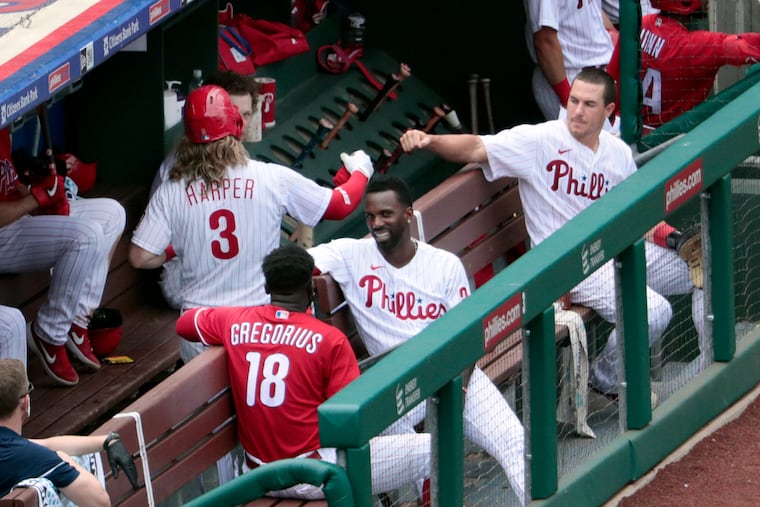What does Mookie Betts’ massive contract extension mean for Phillies catcher J.T. Realmuto?
"The Mookie Betts deal just goes to show that teams can still afford players at this moment and in this trying time of COVID,” said Phillies right fielder Bryce Harper.

On the surface, at least, J.T. Realmuto seemed to have a good day Wednesday.
Realmuto caught five innings of the Phillies’ final intrasquad game. He emerged healthy from a three-week training camp, with opening night set for Friday at Citizens Bank Park. He even got to leave work in time for supper, after the Phillies moved up their scrimmage to avoid a late-day thunderstorm.
Oh, and then there was this: Mookie Betts signed a massive contract extension with the Los Angeles Dodgers.
Betts’ deal, finalized on the eve of the Dodgers’ season opener, is reportedly worth $365 million over 12 years, second only to Mike Trout’s $426.5 million extension for the same number of years.
What does that have to do with Realmuto? Start here: It takes Betts off the market this winter and puts Realmuto in the conversation with Houston Astros outfielder George Springer and Oakland A’s shortstop Marcus Semien as the best position players in the prospective 2020-21 free-agent class.
And as Realmuto said recently, “The top guys usually find a way to get their dollars.”
The question now — at the outset of a pandemic-shortened, fan-free season and with team owners claiming they will lose hundreds of millions of dollars — is whether Betts’ megacontract is merely an outlier or a harbinger that cash will flow as freely as ever in what many believe will be a depressed economy for free agents.
The answer will represent the difference between Realmuto getting filthy rich this winter or setting a record for a catcher’s annual salary.
“I think the Mookie Betts deal just goes to show that teams can still afford players at this moment and in this trying time of COVID,” said Phillies right fielder Bryce Harper, who has been outspoken about his desire for the club to keep Realmuto from reaching free agency. “I think that definitely helps J.T. and his cause.”
Maybe so. But the first impression among a few front-office types across the game is that Betts’ contract is probably an outlier.
For one thing, the Dodgers are a big-market team with payroll flexibility beyond this season and no World Series championships since 1988. They also gave up prospects to acquire Betts from the Boston Red Sox in February and were at risk of losing him after only a 60-game season.
For another, Betts is a 27-year-old generational talent, one of the five best all-around players in the game. Like Harper and Manny Machado in a sluggish free-agent market two years ago, Betts was bound to receive one of the biggest paydays in the history of the sport, pandemic or not.
It’s the middle-market free agents that might not get the contracts they’re looking for this winter. Realmuto doesn’t fall into that category, of course. And by virtue of being the best catcher in baseball, it’s likely he will still cash in big if he reaches the open market after his age-29 season, perhaps even at the salary level that he was seeking before COVID-19.
Word is Realmuto and his agent, Jeff Berry, have their sights set on former Minnesota Twins star Joe Mauer’s $23 million average annual salary from 2011 to 2018, the most any catcher has ever made. But it’s believed they had another number in mind, too: $26 million, the average annual value of the five-year contract extension signed last year by St. Louis Cardinals first baseman Paul Goldschmidt, who is three years older than Realmuto and doesn’t play a premier position.
“J.T. has done what he’s needed to do to hopefully get that deal that he wants, and he deserves that,” said Harper, whose 13-year, $330 million contract stands as the largest ever for a free agent. “We’re 60 [games] away from him getting to free agency and so forth, so I think J.T. is going to do what’s best for his family, what’s best for himself, and hopefully that’s him coming back to Philly and getting a deal done.”
Thus far, the Phillies seem to have taken a wait-and-see approach to Realmuto’s next contract. General manager Matt Klentak noted recently that “the [economic] landscape we left in March is going to be different than the one we return to now.” Until they know what the adjusted market will bear for Realmuto, it might not be wise to bid against only themselves.
Likewise, with free agency beckoning in November, Realmuto might prefer to gauge his value on the open market, even though he enjoys playing in Philadelphia. With the contracts of pitchers Jake Arrieta and David Robertson and shortstop Didi Gregorius set to come off the books after this season, the Phillies can afford to wait and still be the high bidder for Realmuto, one of managing partner John Middleton’s favorite players.
“We still love the player. We’d still would love to have him in red pinstripes for the long haul,” Klentak said a few weeks ago. “But there’s a lot of uncertainty in the game right now on a variety of levels, so we just need to factor that all in.”
It’s doubtful that Betts’ record-setting contract changes much.